Windows 7 Performance Guide
by Ryan Smith and Gary Key on October 26, 2009 12:00 AM EST- Posted in
- Systems
Laptop Performance
With the different power and performance characteristics of a laptop (not to mention the battery!) we’re going to break out our laptop results from the rest of our desktop data.
If you have seen our OS Mobility Explored article, where we compared laptop usage across Windows and Linux, then you should have a pretty good idea of what you’re about to see. The following is a selection of the most relevant data from that article, using Gateway’s very similar Intel and AMD power laptops: the NV5807u and NV5214u respectively.

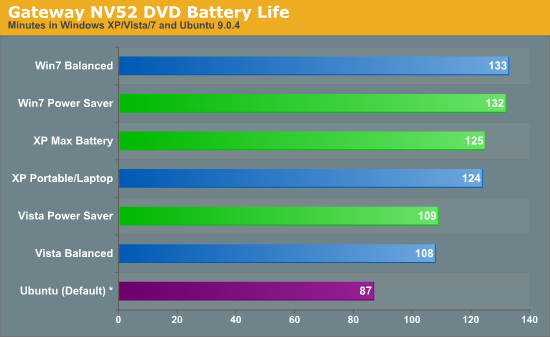
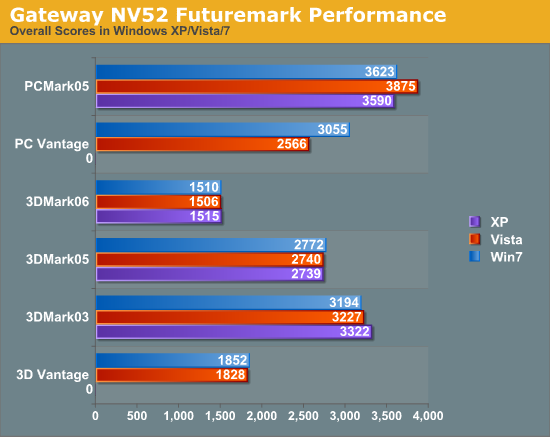
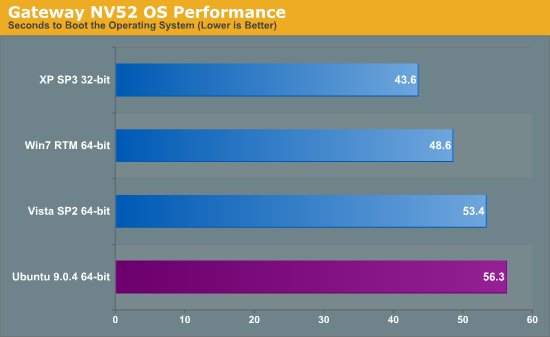
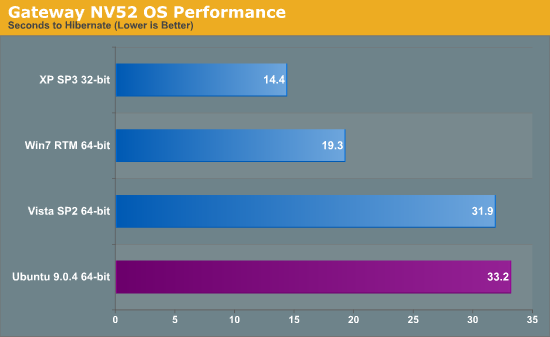
Starting with the NV52, our Athlon 64 X2 laptop, we see some immediate advantages for Windows 7. In terms of battery life it edges out Windows XP in all situations, and clearly surpasses Vista, particularly in DVD playback. As laptops have been one of Vista’s most troublesome areas, it’s here where Microsoft needed to see some real improvement, and they have delivered.
Meanwhile performance in our limited suite of benchmarks is largely tied. Vista wins in PCMark 05 only due to higher scores in the transparent windows test (something we suspect is a product of the WDDM 1.1 memory optimizations), XP takes 3DMark 03, and Win7 takes PCMark Vantage. Our tendency is to put more weight in to PCMark Vantage, since it’s quantifying the improved laptop performance that we’ve been experiencing, but aren’t necessarily seeing in other benchmarks.
Finally we have boot and hibernation times. Microsoft has been putting some effort in to bringing down the boot times of Vista, and it shows here, although XP is too tough to beat. Hibernation is a similar story – it’s easier to resume from hibernation when you have less stuff to load.
The NV52 paints what’s probably going to be the average picture for Windows 7 on laptops. It’s as fast (if not faster) than XP and can pull off a slightly better battery life, but it’s not going to be able to beat XP in booting/hibernating.
Next we have the NV58, our Intel C2D laptop.
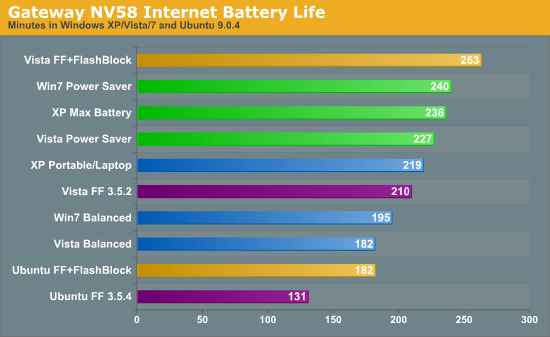
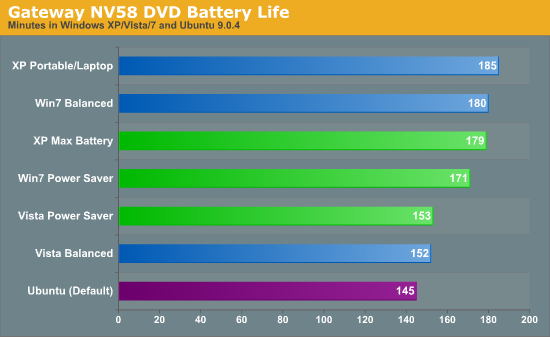
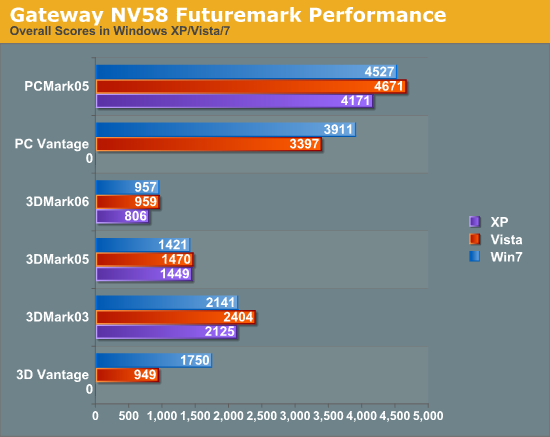
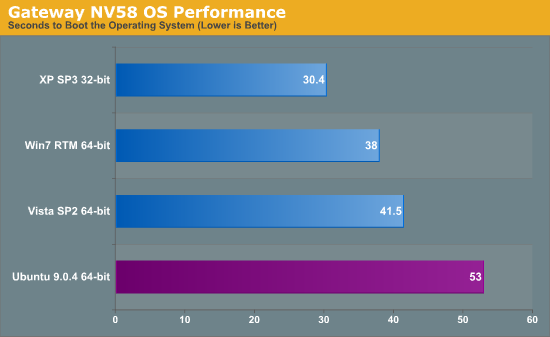
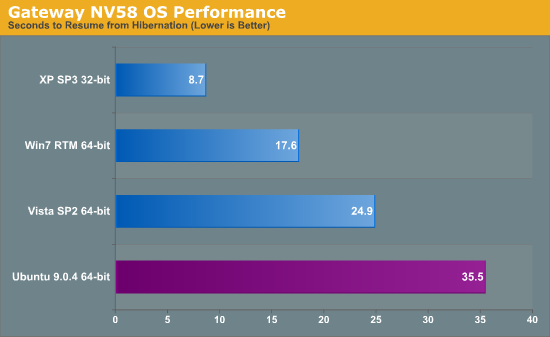
With battery life, we see some things similar to the AMD based NV52, and some things are different. Vista is still a loser, but Win7 doesn’t manage to build any kind of lead over XP in DVD playback, letting XP take it by a small margin. Battery life in our internet testing does go to Win7 however, once again with a small margin.
As for performance, we largely have the same results as with the NV52. Win7 wins PCMark Vantage, the test we care the most about, and pulls near-even elsewhere. 3DMark Vantage is an outlier this time, but this seems to be related to the Intel integrated graphics in this laptop.
Finally boot and hibernation times are similar to what we saw with the NV52. XP is still faster to boot and faster to return from hibernation, the benefit of an older, lighter-weight operating system. Win7 does handily beat Vista in all cases, however.










207 Comments
View All Comments
xrror - Tuesday, October 27, 2009 - link
Well businesses that are stuck with an Exchange server and need computers on a Domain for it probably are still interested in a volume license.Heh, a small SOHO probably just get the "Family Pack"... or just keep running the WinXP machines they have into the ground. Why upgrade at all?
darwinosx - Monday, October 26, 2009 - link
Yet another superficial look at Windows 7. Not a word about the registry and it's egregious affect on stability and performance. Not a word about the malware fest that is still Windows. Nothing about Windows very poor utilization of multi-core procs and large amounts of memory. No, its all as if the only thing that matters about an OS is the UI. Is Anand the only one at Anandtech that has taken an operating system class? Is he the only one who knows anything about OS X? It would appear so.Your brief "comparison" of Snow Leopard and Windows 7 was worse. Of course. It is not a minor upgrade at all unless..you only look at superficial things as you did the Windows 7 review. SL has had a few minor issues affecting a few people. Hardly "teething problems". The only differentiator between 7 and SL is now hardware? Unbelievable. When did Anandtech turn into CNET?
You can barely spell Linux apparently so I don't think we will see any kind of comparison there.
If you don't know anything about OS X or Linux then don't bother to mention ether in the future.
Genx87 - Tuesday, October 27, 2009 - link
Did you make a Youtube video about this? lolxrror - Tuesday, October 27, 2009 - link
Which operating systems can I legally run on hardware I own:[X] Linux
[X] Windows XP
[X] Windows Server 2003
[X] Windows Vista
[X] Windows Server 2008
[X] Windows 7
[ ] Mac OS9
[ ] Mac OSX
When I visit AnandTech what computer trends/items do I find most relevant to me:
[X] Upcoming and exciting computer technologies
[ ] The latest and greatest media platform with DRM capitalization
[X] Upgrades for open and standards based x86 platforms
[ ] Hacks and modifications for closed x86 platforms
[X] Price/performance comparisons for gaming hardware
[ ] Articles denying relation of mal-ware output and OS marketshare
Griswold - Tuesday, October 27, 2009 - link
Hello clown boy!tomaccogoats - Monday, October 26, 2009 - link
While I can't support this tirade, I will say Anandtech definitely suffers in Mac and Linux areas. Then again, their slogan is "your source for hardware analysis and news", which I guess doesn't really warrant that it needs to be classed in those areas. Still, the latest Linux articles are August 2009, and then 2005!JimmyJimmington - Monday, October 26, 2009 - link
Mind if I log into your guest account?darwinosx - Monday, October 26, 2009 - link
If thats all you got it isn't much. That is certainly a bug and a highly visible one. But it affects a tiny number of users who upgraded Leopard to Snow Leopard in a very specific way under a certain set of circumstances and even not all of them have the issue. Apple has a fix in 10.6.2 which will be out in a matter of days. To bring that up in the face of the yawning chasm of security vulnerabilities that is Windows 7 is pretty laughable.ibarskiy - Monday, October 26, 2009 - link
Once again, it's time you actually supported your statements with facts. What security chasm? Please cite vulnerabilities and extent to which OSX is not subject to them. And while you are at it, please explain how come it is that Mac OS got broken into faster when the compensation for the break in was the same between Mac OS and (at the time, but for all practical purposes immaterially) Vista [pwn2own 2009]. Oh, and MacOS was broken into twice to Vista's one time. So which again is more secure?ibarskiy - Monday, October 26, 2009 - link
Correction; it was Windows 7, indeed.